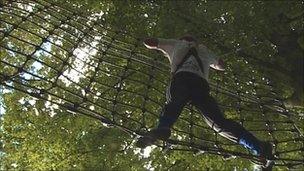Helping ex-soldiers find a place 'in the real world'
- Published
Richard Wilson, trainer at Remount, describes the struggle to adjust to civilian life
Taking a few wobbly steps, Carl Carter looks down. Solid ground is at least 20 feet below, and the rope he's balancing on looks perilously thin. But he takes another step, and another, until he reaches the end of the obstacle course.
This team-building exercise mirrors how many young, soon-to-be ex-soldiers feel as they face an unfamiliar life outside the Army.
The high-wire walk is part of a four-day course organised by the charity Remount, which aims to help servicemen and women make that sometimes difficult transition.
And with 17,000 Armed Forces' jobs set to go following the strategic defence review,, external its services could soon be in much greater demand.
No vacancies
All of those alongside Carl at Remount's centre at Brathay Hall, in Cumbria, will leave their Army family in a matter of months.
Carl is 22, but has already served for five years, including a tour of duty in Iraq. He wants to spend more time with his family, but is well aware he is stepping into an uncertain future - not least because there are currently no vacancies in his chosen profession - the fire service.
"It's scary," he admits. "A lot of my mates are finding it hard to find work, and there aren't that many jobs. I think it'll be for the best because I want to see my child grow up, but I'll miss my mates."
Through classroom exercises and outdoor challenges, Carl and his fellow soldiers are encouraged to discover their skills, strengths, aims and ambitions beyond military life.
That can entail taking a hard look inside - at the highs and lows of their lives before and during military service - and at what kind of future they would like to build.
Simon Taylor, 23, has served in Afghanistan twice. He is part of 1st Battalion Welsh Guards, who suffered high levels of casualties during their last tour.
Almost all the soldiers here have lost close friends, or seen their comrades injured. The scars of those experiences are not always visible, but it is a legacy that may be harder for many to deal with once they are out in the civilian world, where friends and colleagues have not shared similar experiences.
Simon wants to find a job in his native Wales and start a family, although he is well aware that the economic situation will make finding work that much harder.
"We'll be on our own in the real world. We're not all going to have our friends to fall back on, so we'll be without that support," he says.
But there is also a positive side: "There will be no one telling me what to do. I can't wait, but I am really, really nervous."
Self-esteem
Remount, which is funded entirely by charitable donations, was set up by former Army officer Neville Barton, who later worked in industry and banking.
It was his own experience of depression after leaving the Army that motivated him.
"I felt something was being missed," he says. "There was a good resettlement package, and a lot of great work by other charities such as the Royal British Legion, Combat Stress, the Army Benevolent Fund and Help for Heroes.

The four-day course helps servicemen and women decide how to build a new life after the Army
"But I realised that they were dealing with people who had become casualties in some way, so I thought that something should be done to help prevent those problems in the first place.
"One of the difficulties soldiers face when they leave the Army is keeping up their self-esteem, because you go into a new environment and culture in civilian life which is often based on self-interest, after emerging from one in which selflessness is key.
"Loneliness can also be a real problem."
Remount's website, external was developed by Gus Goodall, who attended the course when he was trying to decide whether or not to leave the Army.
He says it helped give him the confidence to take the plunge and set up his own business on civvie street.
"The guys were really supportive, and we formed a network. Some were staying in the forces, some were leaving, and talking it through helped confirm whether or not you were doing the right thing."
Gus has helped create an online network called the Remount 15-minute Club, which aims to offer a virtual community for former soldiers who have met on the course to keep in touch, and offer advice and help, whether practical or simply moral support.
Next year, the charity hopes to raise a million pounds so it can offer its course to 1,000 soldiers.
Neville's aim, he says, is to make sure that those who have risked their lives to serve their country don't stumble on the path back into a now unfamiliar world.
- Published19 October 2010
- Published19 October 2010